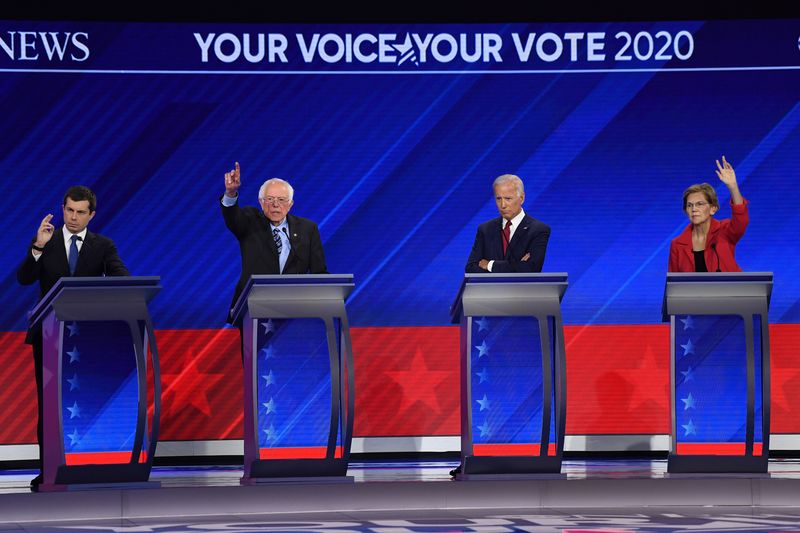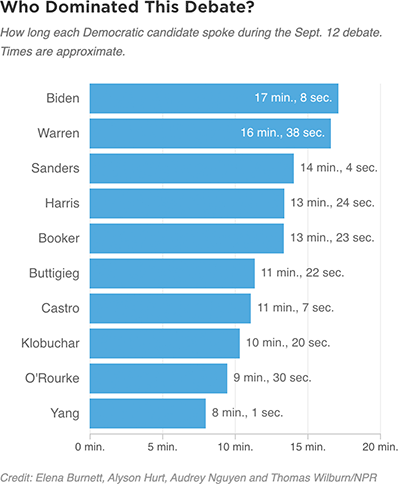Ten Democratic candidates met Thursday night for a nearly three-hour debate. It was the first featured a newly narrowed down field, and the first featuring former Vice President Joe Biden and Sen. Elizabeth Warren on the same stage.
Here are highlights from NPR reporters. For a full recap, see NPR’s coverage here.
A narrowed debate field has sharpened many of the candidates’ messages and tactics. Former Vice President Joe Biden, a focal point of attacks in the previous two debates, was more aggressive in center stage tonight. Biden has enjoyed some ideological back-up on stage from rivals like Sen. Amy Klobuchar, who tag-teamed with Biden on health care to criticize the more progressive health care proposals from Sens. Bernie Sanders and Elizabeth Warren to scrap the private insurance system for a government-provided health care for all.

A narrowed down field of Democratic presidential candidates met Thursday, Sept. 12, 2019 for another in a series of debates. CREDIT: Robyn Beck/AFP/Getty Images
Democrats like Beto O’Rourke who have fallen out of the spotlight in recent weeks are having moments of their own. His “hell yes” response to whether he would support legislation to confiscate high-capacity firearms will linger — Republicans will make sure of it.
The nearly three-hour debate came to a close with the front-runner candidates — Joe Biden, Elizabeth Warren and Bernie Sanders — speaking the most.
Some of the most memorable moments were Biden and Julián Castro clashing over the former vice president’s health care plan — with Castro implying that Biden’s memory was failing. Beto O’Rourke hadn’t had a strong debate yet, but his forceful push to ban and buy back assault rifles created a moment for him in the wake of last month’s deadly shootings in his hometown of El Paso.
It’s not clear yet if O’Rourke and other struggling candidates did enough to move the needle or if Warren, Sanders and others going after Biden will chip away at his poll numbers. There will be another debate next month — though with billionaire philanthropist Tom Steyer already qualifying for that, there could be two debate nights yet again. A smaller stage of five or six candidates each night could produce a more substantive debate. – Jessica Taylor
Biden’s Record On Iraq
More than 16 years after the Iraq War began, former Vice President Joe Biden is still struggling to explain his vote for the war and when his feelings about intervention evolved.
Tonight, Biden said he “never should have voted to give [President] Bush the authority to go in and do what he said he was going to do.” He was referring to his October 2002 vote in the U.S. Senate for the authorization to use military force against Iraq. Biden made his comments unprompted by a moderator’s question. It was a deliberate attempt to clarify his record after recently receiving criticism for mischaracterizing his opposition to the war,including on the NPR Politics Podcast.Read more about how his responses have changed here. – Asma Khalid
Long Debate, But Economy A No-Show
In a debate that has stretched for well over two hours, there has not been a single question on the U.S. economy.
By many measures, the economy is in good shape. Unemployment is near a 50-year low at around 3.7%. Wages have been rising at a slow but steady pace. And the tight job market is prompting more people to come off the sidelines and enter the workforce.

But there are also some worrisome signs, and a recentNPR/PBS NewsHour/Marist pollfound that slightly more Americans now disapprove of President Trump’s handling of the economy than approve it. Growth has definitely slowed this year. The economy grew at an annual pace of just 2% between April and June. And forecasters don’t expect much improvement in the rest of the year. Manufacturing activity actually shrank in August for the first time in three years. Factories are especially sensitive to falling demand in the rest of the world, as well as growing uncertainty as a result of the president’s trade war. – Scott Horsley
Buttigieg Gets Personal On Afghanistan
South Bend, Ind., Mayor Pete Buttigieg hasn’t been a central part of this debate — he surged early in the campaign but has stalled recently — but he is the only military veteran onstage, having been a Navy Reserve intelligence officer. Buttigieg responded to a question about the Joint Chiefs chairman, Gen. Joe Dunford, who has called for enduring support for Afghanistan’s government and military.
“You know, I served under General Dunford,” Buttigieg said. “Way under General Dunford, in Afghanistan.”
Buttigieg can talk about the military in more personal terms than anyone else onstage. Another 2020 Democratic hopeful, Hawaii Rep. Tulsi Gabbard, also is a veteran — but she didn’t qualify for this debate. Buttigieg talked about having to be responsible for other troops, and he hit President Trump — who got a deferment from service in Vietnam for allegedly having bone spurs — for using service members as political props.
Buttigieg also slammed reports that Air Force crews have been staying at a Trump property in Scotland during refueling stops even though closer, cheaper options are available. — Jessica Taylor
Harris On The Importance Of Black Education
Tonight’s debate in Houston is noteworthy because it’s taking place at Texas Southern University, a historically black college. California Sen. Kamala Harris pointed out she’s a graduate of a historically black college — in her case, Howard University in Washington, D.C.
Harris said her unique perspective gave her the ability to point out a critical role that historically black colleges and universities play in training teachers. She also pointed to a study that NPR covered this year, which found that teachers of color are critical in closing achievement gaps between white and nonwhite students.
As NPR’s Mayowa Aina reported: “Black students who have just one black teacher in elementary school are 13 percent more likely to enroll in college than their peers who didn’t have any black teachers. Students who have two black teachers are 32 percent more likely to go to college.” — Jessica Taylor

















